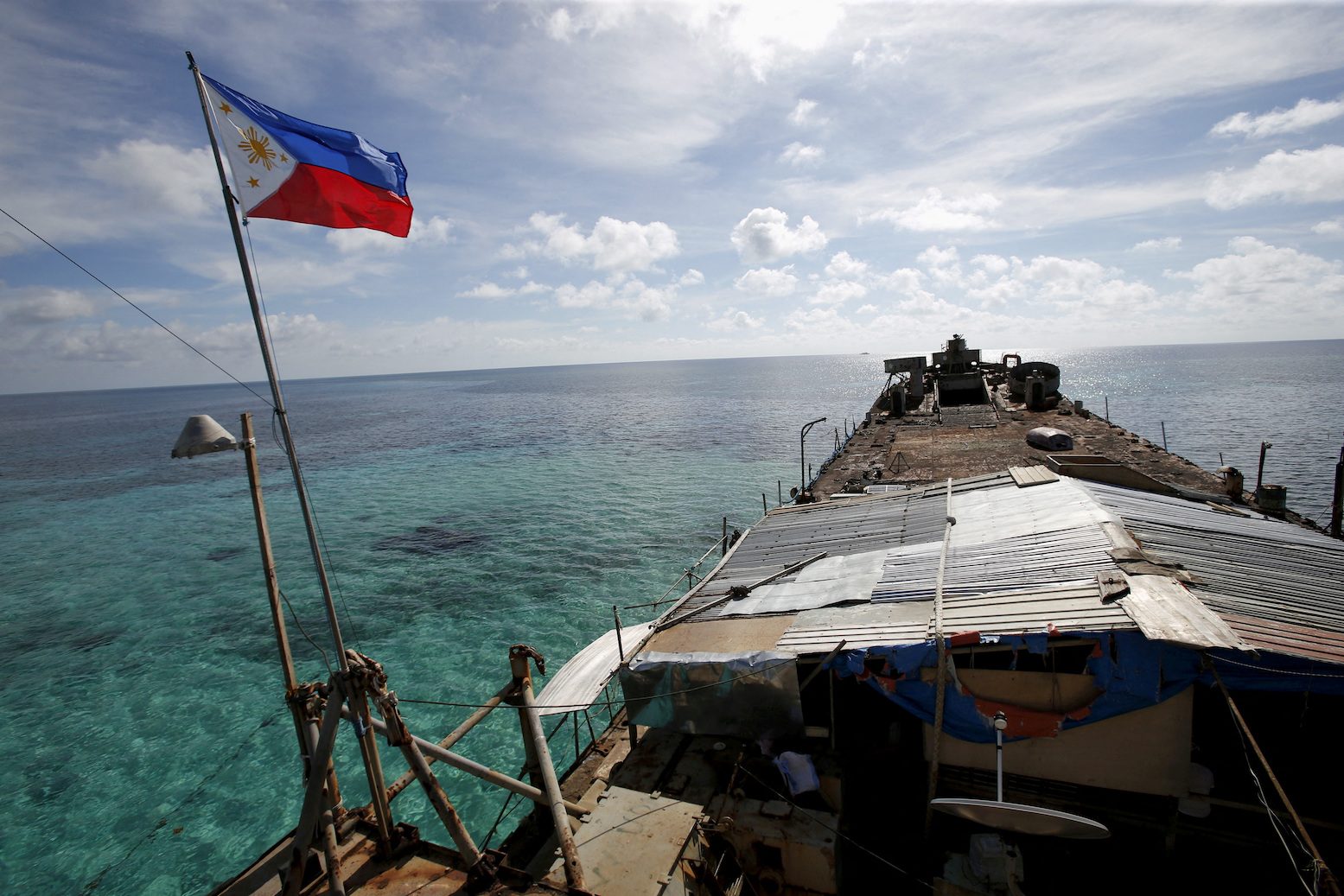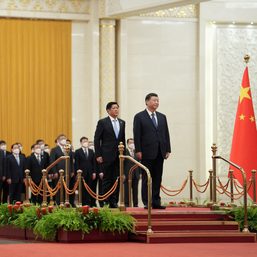SUMMARY
This is AI generated summarization, which may have errors. For context, always refer to the full article.

MANILA, Philippines – The Chinese embassy in the Philippines, in a statement on Thursday, October 26, accused the United States embassy in Manila of making “baseless attacks… in disregard of facts” against what they claimed were “legitimate and lawful law enforcement activities” in Ren’ai Jiao or Ayungin Shoal.
“The statements and remarks of the US Embassy go against the spirit of international law including the UNCLOS. It’s a sinister attempt to endorse the Philippines’ acts of infringement and provocation. We deplore and reject it,” said the Chinese embassy in the Philippines in a statement from its spokesperson.
“Ren’ai Jiao (Ayungin Shoal) has always been China’s territory. It is an integral part of China’s Nansha Qundao (Spratly Islands) The escalation of tension in the South China Sea has been inflated by the US actions,” the Chinese embassy added.
The Chinese Embassy did not specify which statement it was raising alarm over, but said the so-called “attacks” from Washington’s mission in Manila happened in the “in the past few days.”
The Chinese embassy accused Washington of “blatantly emboldening the Philippines’ acts of infringing upon China’s sovereignty and inciting and supporting the Philippines’ attempts to repair and reinforce its warship that was deliberately ‘grounded’” in Ayungin. The Chinese Embassy was referring to the BRP Sierra Madre, a World War II warship that was ran aground on purpose to serve as the country’s outpost in Ayungin Shoal.
“The US even sent over military aircraft and vessels to assist and support the Philippines, and repeatedly sought to threaten China by citing the US-Philippines Mutual Defense Treaty. What the US does has seriously violated international law and the basic norms governing international relations, seriously undermined China’s sovereignty and rights and interests, and seriously jeopardized regional peace and stability,” added the Chinese Embassy, in its latest statement following collision incidents in the West Philippine Sea.
On October 22, even as a resupply mission to the Sierra Madre was ongoing, the Philippines said China’s “dangerous maneuvers” in the West Philippine Sea led to collisions between boats owned or sanctioned by the two governments. A China Coast Guard ship collided with the Unaiza May 2, a Philippine military-contracted boat while a Chinese Maritime Militia vessel hit the Philippine Coast Guard’s BRP Cabra.
Beijing claims it was the Philippines which provoked the incidents.
Manila summoned Chinese Ambassador Huang Xilian over the incident, but since he was out of town, it was Beijing’s deputy chief of mission who was summoned by Philippine Department of Foreign Affairs (DFA) Assistant Secretary Aileen Mendiola-Rau. China also filed a protest over incident through its Embassy in Manila.
Almost immediately, the US Ambassador to Manila MaryKay Carlson issued a statement condemning China for its “latest disruption of a legal Philippine resupply mission to Ayungin Shoal, putting the lives of Filipino service members at risk” The US State Department said that China, “by conducting dangerous maneuvers that caused collisions with Philippine resupply and Coast Guard ships [was] intentionally interfering with the Philippine vessels’ exercise of high seas freedom of navigation.”
The US State Department added that Second Thomas Shoal, or Ayungin Shoal, was within the Philippine exclusive economic zone and is part of the Philippine continental shelf. Citing the 2016 arbitral ruling, the State Department said China’s claims on Ayungin were “unfounded.” US President Joe Biden, in a press conference in Washington on October 26, reiterated that attacks on Philippine planes and vessels in the South China Sea would invoke the Mutual Defense Treaty.
Under President Ferdinand Marcos Jr., Manila ties with Washington have warmed. In April 2023, just months after a state visit to Beijing, Marcos announced that the US would be allowed access to several more military bases under the Enhanced Defense Cooperation Agreement. During Marcos’ official working visit to Washington DC in April 2023, the Philippines and the US released guidelines to better define the terms of the decades-old Mutual Defense Treaty.
At the same time, the Philippines has grown more assertive in its claims in the West Philippine Sea. China has long blamed the US for this, accusing the Western superpower of fueling tensions. “Ren’ai Jiao (Ayungin Shoal) is a bilateral issue between China and the Philippines.
“China has all along been committed to properly managing differences through dialogue and consultation with the direct parties so as to jointly safeguard peace and tranquility in the South China Sea,” said the Chinese Embassy in Manila.
“In seeking selfish geopolitical interests, the US has incited troubles and magnified differences in the South China Sea. This is quite clear to countries in the region. Rather than being a self-claimed responsible power, the US actually created many instabilities across the world, leaving behind one mess after another. Now it attempts to destabilize the Asia Pacific region. Such scheme is doomed to fail,” the Chinese embassy added.
Marcos himself has said in the past that tensions in the South China Sea should not be seen “solely through the lens of strategic competition between two powerful countries.”
“The Philippines firmly rejects misleading narratives that frame the disputes in the South China Sea solely through the lens of strategic competition between two powerful countries. This not only denies us our independence and our agency, but it also disregards our own legitimate interests,” said the Philippine President back in September 2023 during the Association of Southeast Asian Nations (ASEAN) Summit Retreat. – Rappler.com
1 comment
How does this make you feel?











Which really is it? Does or does not China recognize the UNCLOS?